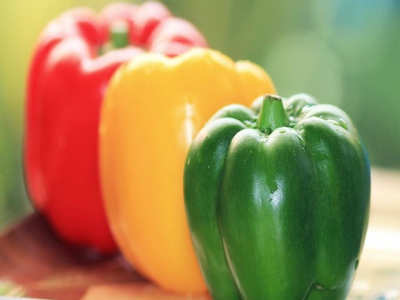What is a pepper, actually?

Peppers belong to the Capsicum genus (family Solanaceae). It’s when we come to common names that things get confusing.
A popular colour combination seen in supermarkets around SA.
Some people will call a chilli a ‘hot pepper’, others will refer to a type of thick-walled, tapered sweet pepper as a ‘paprika’, while yet others will use this name for a long, medium-thin walled, deep-red pepper used for drying to make paprika powder, and so on.
In South Africa, we differentiate between chillies, peppers (usually bell peppers) and paprika. Capsicums have been used in South and Central America since about 7 000BC, with the wild fruit harvested for food and medicinal purposes. Planting began about 2 000 years later, and the development of new varieties began.
It was Columbus who introduced capsicums to Europe. They were an instant hit – and came to be called ‘peppers’ because they were as hot and spicy as black and white pepper of the Piper genus, although not related.
In recent times, capsicums have increased in popularity because of their taste as well as their health-giving benefits.
There are a great number of capsicum species, but only five are of real commercial value. C. annuum is the most popular and includes all the sweet bell peppers and most chillies. The wild varieties of this species are called ‘bird chillies’, because birds find it easy to break off the chilli from the calyx. Birds do not apparently taste the pungency, nor do rodents, as many farmers have found out. Rodents often chew through the most pungent chilli walls to eat the seeds, which are even ‘hotter’.
Cruel gruel
Chickens are no different. I recall as a child having hens that broke open newly laid eggs and ate the contents. To put a stop to this, I mixed mustard and chilli powder with water and poured it into eggshells in the hen house. I reasoned the hens would soon come to associate eggs with extreme discomfort. To my utter amazement, they gobbled up this gruel with relish.
Extremes
Some chillies have been bred to have no pungency and, in fact, may be rather sweet. At the other end of the spectrum are the ‘super hot’ varieties – with names such as ‘Carolina Reaper’, ‘Trinidad Scorpion’ and ‘Naga Viper’ – developed for sauces and for ‘chilli heads’, who think it’s macho to consume chillies which are too hot for most.
(Capsaicin and other related chemicals give chillies their ‘bite’. Capsaicin is also the main ingredient in pepper spray.) Bell peppers have been going through a transformation, with thicker walls being bred and greater emphasis placed on visual appearance, with the fruit required to be smooth and symmetrical.
Most start off as green and turn to various colours as they mature to ripeness. Apart from being sweeter and with less of the strong peppery flavour, they are attractive and add colour to salads and cooked dishes. These colours include red, yellow and orange. Some varieties have different colours – such as blond, black, purple and chocolate – in the immature state, and are usually marked in these colours. They usually mature into shades of orange or red, though.
In South Africa, only green, red, yellow and, occasionally, orange, are grown. Red, green and yellow with one colour of each – ‘robot packs’ – are popular as they add colour to dishes. Preferences vary from one country to another. We like our bell peppers to be squarish, whereas many countries prefer longer fruit as there is less waste after trimming. Elsewhere, they prefer conical bell peppers.
In this genus, there is something for everyone.
Related news
 Other Swiss chard pests
Other Swiss chard pests In addition to those already discussed, there are other pests likely to be a problem with Swiss chard from time to time. Let’s look at three of the most common
 Hot or Sweet, You CAN Grow Peppers in Containers
Hot or Sweet, You CAN Grow Peppers in Containers Peppers can be a little tricky to grow. So, even if you have a garden, you might want to grow your peppers in containers
 Quick Tips for Preserving the Garden Harvest
Quick Tips for Preserving the Garden Harvest Food preservation is a time-honored tradition that allows the abundance of the fall harvest to be saved for the winter months.